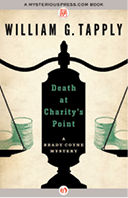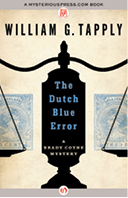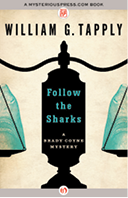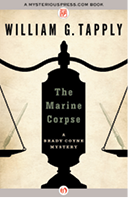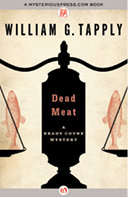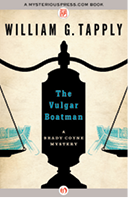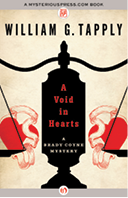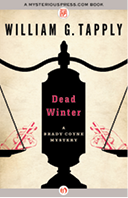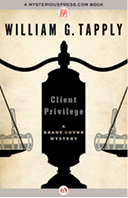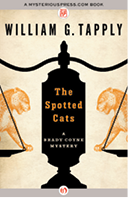One-Way Ticket (29 page)
Authors: William G. Tapply

Agent Loudon looked at me, then smiled. “Hang on a minute, please.” She grabbed Horowitz by the elbow and dragged him out to the corridor.
They were back about five minutes later. Grace Loudon sat down beside me. “Lieutenant Horowitz says, knowing you the way he does, we might make more progress if we didn’t play games with each other.”
“I don’t play games,” I said.
She smiled. “Assuming Robert Lancaster’s role in all of this was what we understand it was, and assuming he cooperates fully in our investigation, I’m prepared to recommend to the federal prosecutor that we do not charge him with any crime.”
“You willing to put that in writing?” I said.
“In writing?” She shook her head. “Certainly not.”
I looked at Horowitz and arched my eyebrows.
He nodded.
“Can we shake on it, at least?” I said.
Agent Grace Loudon smiled and held out her hand.
We shook. “Good enough for me,” I said.
Robert was lying there with his eyes shut and his hands folded peacefully on top of his blanket.
I poked his shoulder. “Wake up,” I said. “You’ve got guests.”
His eyes popped open. He looked at Grace Loudon, then Horowitz, then me. “These are the people you want me to talk to?”
“Yes,” I said. “Lieutenant Horowitz, state police, and Agent Loudon, FBI. You don’t have anything to hide.”
“I don’t?”
“No. Just tell them everything. I’ll be sitting right here. If they ask you something, um, inappropriate or irrelevant, I’ll interrupt. If you want to consult with me before answering a question, we can do that. And if I hear you lying or exaggerating or doing anything but telling the truth, I’ll help you get back on track. Okay?”
“Okay,” he said. “I want to get it off my chest.”
R
OGER HOROWITZ CAME TO
my house six days after Federal Agent Grace Loudon deposed Robert Lancaster in the hospital. It was a sultry evening in late June. I cooked us cheeseburgers on my backyard grill, and we ate them with bottles of Sam Adams lager at my picnic table. Horowitz sneaked pieces of his burger to Henry, who knew a sucker when he saw one and sat expectantly beside him the whole time. We talked about the Red Sox and hybrid automobiles and the upcoming mayoral election and the weird weather we’d been having.
When I brought out the coffee, Horowitz said, “Michael and Kimberly Warner have agreed to plead guilty. Robert Lancaster will not be called upon to testify. Thought you’d want to know.”
“They made a deal, huh?”
“Kimberly Warner caved,” he said. “Spilled out the whole story. When her husband heard about it, he talked, too. They’ll both spend some time in federal prison. Him a few years more than her.” He shrugged. “The prosecutor decided there was no purpose in dragging the family through the mud.”
“Judge Lancaster had some input, I imagine.”
“I don’t know about that,” he said. “Wouldn’t be surprised.”
“Good deal all around, then, huh?”
He shrugged. “The victim survived, and the ransom money was recovered. The judge will get it back when the feds decide they don’t need it for evidence. It could’ve been a lot worse.”
“They were going to kill him, you know.”
He shrugged. Can’t prove it. Neither of ’em would admit to it.” He took a sip of coffee. “So how are they doing?”
“The Lancaster family?”
He nodded.
“Robert’s back at school finishing up his summer classes,” I said. “When that’s done, his father’s taking him to Idaho for a week of trout fishing with my son Billy, who’s a guide out there.”
“They’re doing good, then.”
“They’re both compulsive gamblers,” I said. “Same as alcoholics. They’ll have to fight it all their lives. We’ll see.”
We sat there in comfortable silence for a few minutes. The sky over the city was darkening, and the stars were beginning to pop out.
“Any news on the guy with the missing face?” I said.
“Louie Malatesta?” Horowitz shook his head. “No faceless dead bodies have turned up. No one’s been spotted walking around without his face, either. Nobody knows nothing. Be nice if we could nail Paulie Russo for it, but I’m not holding my breath.” He leaned forward and peered at me. “You notice the giant elephant that’s been clomping around here in your backyard?”
“Huh?”
“The most obvious thing that we haven’t talked about?”
“Oh,” I said. “Evie.”
He nodded.
“She’s in California with her father,” I said. “He’s dying of pancreatic cancer. They’ve given him maybe six months.”
“So how’s she doing?”
I shook my head. “I don’t know.”
The next day around four in the afternoon I drove directly from Judge Adrienne Lancaster’s big Tudor in Belmont to Paulie Russo’s headquarters in the North End with a red gym bag decorated with a Nike swoosh on the seat beside me. I called Paulie from my car to tell him I was on my way.
One of his associates was waiting for me on the delivery platform in the alley. He frisked me and peeked into the gym bag. When he was satisfied that I was neither armed nor wired, he said, “Okay, Mr. Coyne. Mr. Russo’s waiting for you.” He held the door for me, then followed me up the back stairs.
Paulie looked like he was about to go play a round of golf. He was wearing a blood-colored polo shirt and vanilla-flavored linen pants. A pair of wraparound Ray-Bans was perched on top of his head.
He stood up when I walked in. I went over to his desk, dropped the gym bag on it, and sat down.
Paulie picked up a tall glass that was coated with condensation and took a long swig from it. I could hear the ice cubes clink against his teeth. When he put the glass down, he said, “Iced tea with crushed mint leaves, little splash of bourbon. Want some?”
“No,” I said. “Thanks.” I pointed my chin at the gym bag. “Aren’t you going to count your money?”
“No need, Mr. Coyne. I trust you.”
“Sixty grand,” I said. “Six bundles of hundreds. That covers it, right?”
He nodded.
“Including interest.”
“Whatever.” He waved his hand in the air. Sixty thousand dollars didn’t mean much to Paulie.
“Now the Lancaster family is clear of you,” I said. “Agreed?”
“That’s right,” he said.
“If you ever let Robert Lancaster anywhere near a game of yours, or Dalt, either, for that matter…”
“We got a deal, Mr. Coyne. I gave you my word. You don’t need to threaten me.”
“It wasn’t a threat,” I said. “All I meant was that I’d be very disappointed if I found out that you were not to be trusted.”
“You don’t need to worry about that,” he said. “Sure you don’t want some of this iced tea?”
“I bet it’s good,” I said, “but I can’t stay.” I glanced around the room. One thug was standing by the door, and another was leaning against the wall off to the side of Paulie’s desk. “So where’s Louie?”
Paulie looked at me. “Who?”
“Your associate. The guy with the wart on his face. Malatesta.”
He shrugged. “I don’t know who this Louie is.” He lifted his chin at the goon by the door. “You know some Louie Malatesta?”
“Not me,” said the goon.
I smiled. “My mistake, I guess.”
On the Wednesday evening before the long Fourth of July weekend, Henry and I were out in the backyard watching another Red Sox game on the portable TV. I’d been watching a lot of baseball lately.
In the years we’d been together, Evie and I had always taken an extra day on each side of the Independence Day holiday weekend to get away, sometimes to an out-of-the-way B and B in northern Vermont or New Hampshire, once to a rented cottage on Cape Cod, and the past couple of years to Martha’s Vineyard, where we stayed with J. W. and Zee Jackson. Wherever we ended up, we fished, we poked around antique shops, we explored flea markets, we ate in nice restaurants, we stayed up late and slept late, we went to the movies when it rained, we read paperback novels, and we made love on a blanket under the moon.
This time, though, Evie was in California, and the long weekend loomed like a black thunderhead on my horizon.
The last time I’d actually talked with her was when I pulled to the side of Route 128 on my way to Gloucester the night I found Robert Lancaster on Mike Warner’s boat. The soft June rain had been pattering down on the roof of my car, and Evie told me she didn’t know when—or even if—she’d be back. She wanted me to live my life, she said. She was calling to set me free of her.
I’d tried to call her many times since then. It had been about two weeks, and in all that time, she never once answered her phone.
At first I left what I intended to be casual, unthreatening messages. “Hi, babe. Just want to say hello and see how things are going,” or, “Thinking of you, kiddo. Hope Ed’s doing okay.”
After a while, I stopped leaving messages. I let it ring, listened to her familiar voice mail message—“It’s Evie. I can’t come to the phone. Leave a message and I’ll get right back to you”—and then hung up. Leaving no messages was better than having her ignore them.
She had not gotten back to me. Not once. I wondered if she returned other people’s calls, if it was just me.
I suspected it was just me. That was her message.
It was about time I got it.
My cell phone sat on the picnic table beside my empty bottle of Long Trail ale. I never went anywhere without that phone anymore, just in case.
I picked it up. Evie’s cell was number one on my speed dial. I thought about it, then pecked out the Jacksons’ number.
J. W. answered on the second ring.
“It’s Brady,” I said, “and I wonder if you and Zee want to do some fishing this weekend.”
“Always,” he said. “We’ll do some eating and drinking, too. Just tell me what ferry you guys’ll be on.”
“Guy,” I said. “Just me.”
J. W. didn’t say anything for a minute, in case I chose to elaborate, which I didn’t. Then he said, “Okay. Great. The stripers have been biting at Lobsterville, and the blues’re blitzing off all the beaches, and the martinis show up every afternoon on our balcony. We’ll have some fun. Bring Henry. Zee loves that dog.”
“Henry would like that,” I said.
A
S ALWAYS, I AM
indebted to my indispensable support group:
Vicki Stiefel, my wife, my first and best critic, a terrific writer and teacher, and my love;
Keith Kahla, my editor all these years, and the most astute and hardest-working one in the business;
Fred Morris, my agent, who allows me the luxury of not worrying;
My kids and stepkids, Mike, Melissa, Sarah, Blake, and Ben, who give me incentive and claim always to like my books;
My students at Clark University, who inspire me with their talent and motivation and energy and enthusiasm;
The good citizens of Hancock, New Hampshire, who pay close attention and give me a lot of ideas;
And all my writing friends and acquaintances, professional and amateur both, who remind me that it’s always hard, but we have no choice.
All rights reserved, including without limitation the right to reproduce this ebook or any portion thereof in any form or by any means, whether electronic or mechanical, now known or hereinafter invented, without the express written permission of the publisher.
This is a work of fiction. Names, characters, places, and incidents either are the product of the author’s imagination or are used fictitiously. Any resemblance to actual persons, living or dead, businesses, companies, events, or locales is entirely coincidental.
Copyright © 2007 by William G. Tapply
Cover design by Kathleen Lynch
978-1-4804-3630-5
This 2013 edition distributed by MysteriousPress.com/Open Road Integrated Media
345 Hudson Street
New York, NY 10014


